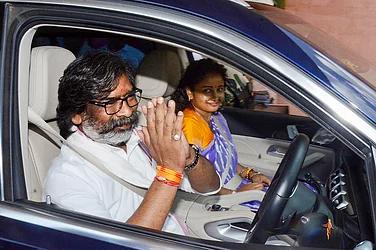Eleven Muslim families were left homeless a day ahead of Bakrid in Madhya Pradesh’s Mandla on suspicion of ‘storing beef’. In Aligarh, Uttar Pradesh, a man was lynched by a Hindu hardliner mob on suspicion of theft while on his way back home a day after Eid. In Telangana, stones were pelted at a Madrasa on suspicion of transporting cattle for Bakrid. Javed, a shop owner was arrested and his shop was ransacked in Himachal Pradesh’s Nahan for ‘inciting religious violence’ by posting a picture of animal sacrifice.
Muslims In India Still Under Threat As Mob Attacks, Lynchings Continue
Despite the BJP's loss of its national majority and the Opposition's claims of democratic victory, incidents of mob lynching have continued unabated, with neither the ruling government nor the Opposition addressing the violence

The Muslim community in India has been threatened and sidelined amid a Hindutva rage that has only increased in the past decade and they continue to be threatened. One of the first cases in the recent past which sent shockwaves across the nation was that of Mohammad Akhlak in 2015, when he was lynched in UP's Dadri for allegedly storing and consuming beef. In 2017, Pehlu Khan, a dairy farmer from Nuh was allegedly lynched by about 200 cow vigilantes in Rajasthan on suspicion of illegally transporting cattle for slaughter. Several other cases have been reported where Muslims as young as 15 years old have been attacked on trains, set on fire, tied to poles, stripped naked, and stoned to death.
On June 4, when the Bhartiya Janata Party (BJP) – despite a historic third term – lost its national majority, opposition parties portrayed it as a victory for the country’s democracy and secular traditions. Many analysts were of the impression that the shocking results would force the BJP’s dependence on coalition partners, in turn moderating the rise of Hindutva in this fragile religious ecosystem.
However, all of the incidents above have occurred after the Lok Sabha results which apparently presented a stronger Opposition. Neither the ruling government nor the Opposition has paid much heed to these incidents of violence.
On June 15, an Eid was snatched away from 11 families in tribal-dominated Mandla in Madhya Pradesh. Their houses, allegedly built on government land, were demolished, leaving them homeless in scorching heat. They were booked under the Cow Slaughter Protection Act. The action, Mandla Superintendent of Police Rajat Saklecha told PTI, was taken in view of an ‘illegal beef trade’ in the state. The police had received a tip-off that a large number of cows had been held captive for slaughter in Bhainwahi area of Nainpur, Mandla.
In another incident on the day of Bakrid, in the Muslim-dominated Old Delhi, a group of people from the Jain community reportedly dressed up “like Muslims” to buy goats and “save” them from the religious sacrifice.
In the run-up to the Lok Sabha elections, while the BJP’s campaigns were far more incendiary than previous elections with a direct attack on Muslims’ dignity and rights, opposition parties challenged this rhetoric by raising issues around unemployment, inflation and social justice. But it was also noticed that there was a strategic distancing of opposition parties from using the word ‘Muslim’ in their speeches. Perhaps, this was done to avoid the constant criticism from leaders of the ruling party, including Prime Minister Narendra Modi himself, terming them ‘Muslim-friendly’. But whom does this help?
In an article titled ‘Muslims And the Mandate’ in Outlook’s June 21 issue, Tanvir Aeijaz questions whether the Indian democracy can flourish and achieve a developed status while ignoring simultaneously the big Muslim question in its journey of electoral democracy. He questions whether the majoritarian impulses and politics solve the increasing decline of political representation of Muslims in almost all the public institutions in India.
Data also shows that the 18th Lok Sabha has the lowest share of Muslim MPs in six decades, with the ruling party having none. There are a total of 24 Muslim MPs (4.4 per cent) – seven from Congress, five from the All-India Trinamool Congress (AITC) and four from Samajwadi Party (SP). The others are from the Indian Union Muslim League (3), Jammu & Kashmir National Congress (2), All India Majlis-E-Ittehadul Muslimeen (1) and two independents.
Regardless, there is hope for change in the community, for peaceful co-existence instead of the fear of oppression. But what will it take for Muslims to feel safe in India? Perhaps, hope and a language of fraternity are the only way out of the vulnerability.




















